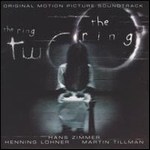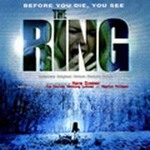When the horror film The Ring, director
Gore Verbinski
's English-language remake of the Japanese movie Ringu, was released in October 2002, it was not thought to rate a soundtrack album. But $250 million in worldwide grosses later, that must have seemed like a mistaken decision, so DreamWorks Pictures and Decca Records made up for it with the appearance in March 2005 of this soundtrack album, which mixes music from both The Ring and The Ring Two (the latter film based on Ringu 2 and directed by
Hideo Nakata
, who directed both Ringu and Ringu 2, in his American debut). Hans Zimmer, who since 1994 has been one of the busiest film composers in the business, sometimes having as many as four movies in release in a year, is solely credited for the music of both films in those small-print credit lists printed in the paper and displayed in television commercials. But the album also lists two other musicians in equal-size typeface on the cover,
Henning Lohner
and
Martin Tillman
. Both have worked with Zimmer before,
Lohner
as an arranger and
Tillman
as a cellist. Inside the CD booklet, there are credits for "additional music" to
James Dooley
and
Trevor Morris
. All of this may suggest that, at least when it comes to the soundtrack album, Zimmer is willing to acknowledge that others make important creative contributions to his scores. Listening to the album, it seems appropriate that an arranger and a cellist get equal billing, if only because the arrangements seem to have a lot to do with the scoring, in terms of the expected moods of dread and suspense the music provokes and underlines, and because there's an awful lot of work for cello, as the lower strings carry much of the sound, sawing away in quick rhythmic patterns at what must be the most frightening moments onscreen. Appropriate to the horror film genre, the music is either very soft and slow, with minor-key, single-note piano melodies backed by sustained violin passages, or very loud and rhythmic, building up to thundering climaxes. The instrumentation changes radically at the ninth track, "She Never Sleeps," however, and the remaining four tracks all largely abandon orchestral instrumentation in favor of synthesizers and programming, some of it with a distinctly rock feel. Unlike the videotape that is supposed to kill its viewers in the films, the disc probably won't harm listeners, but they are liable to feel uneasy, and that of course is precisely the idea.













